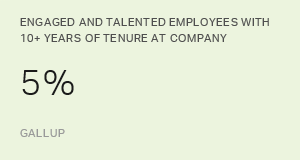Gallup's research indicates that employees don't leave companies; they leave managers and supervisors. The impact that a supervisor has in today's workplace can be either very valuable or very costly to the organization and the people who work there.
Making sure that all employees have quality relationships with someone who can guide them is one of the 12 key discoveries from a multiyear research effort by The Gallup Organization. Our objective was to identify the consistent dimensions of workplaces with high levels of four critical outcomes: employee retention, customer metrics, productivity, and profitability. The research identified 12 dimensions that consistently correlate with these four outcomes -- dimensions Gallup now uses to measure the health of a workplace. An associated research effort, in which Gallup studied more than 80,000 managers, focused on discovering what great managers do to create quality workplaces.
As employees, we have all had unpleasant experiences with bad supervisors or managers. Many of us have also experienced the benefits of a good one. Employees see an amazingly clear difference between good and bad supervisors, according to Gallup evaluations. Yet, when we ask employees, "Do you want to be managed?" everyone says "No." Why is this? Because we automatically think of our bad experiences. What if their best supervisors could manage those employees? Would they want to be managed in that case? Yes. So, the issue is really this: What makes a great manager?
Gallup finds that great managers and supervisors possess identifiable talents, which Gallup defines as naturally recurring patterns of thought, feeling, and behavior. These managers find a true sense of satisfaction when their employees grow and succeed, even if the employee's success surpasses that of the manager. Great managers intrinsically know how to match the right person with the right roles to produce the best possible results. They set expectations by defining the desired outcomes. They don't dissect every role down to exact steps. They help people grow within a role instead of grow out of it. And they always try to bring out what was left in versus trying to put in what was left out.
Great supervisors genuinely care about the people they work with. They treat people as individuals rather than treating everyone the same way. Supervisors serve as filters between broad organizational changes and employees. They help employees make sense of new initiatives and thus gain true acceptance and understanding. One could speculate that people are not resistant to change; they just have no one to explain how modifications will affect them and their jobs.
For years, Gallup has learned from surveys that the credibility of senior management is critical to employee perceptions of the organization. This led us to encourage CEOs and leaders to increase their visibility and create clearer communications. Then, three years ago, we made a discovery: For employees, the credibility of senior management is driven largely by the quality of relationships employees have with their supervisors. Thus, rather than feeling the need for a town-hall meeting, the CEO should feel compelled to ensure that all employees have caring relationships with their managers or designates.
In next week's column, we explore Item 6 of 12: "There is someone at work who encourages my development."


